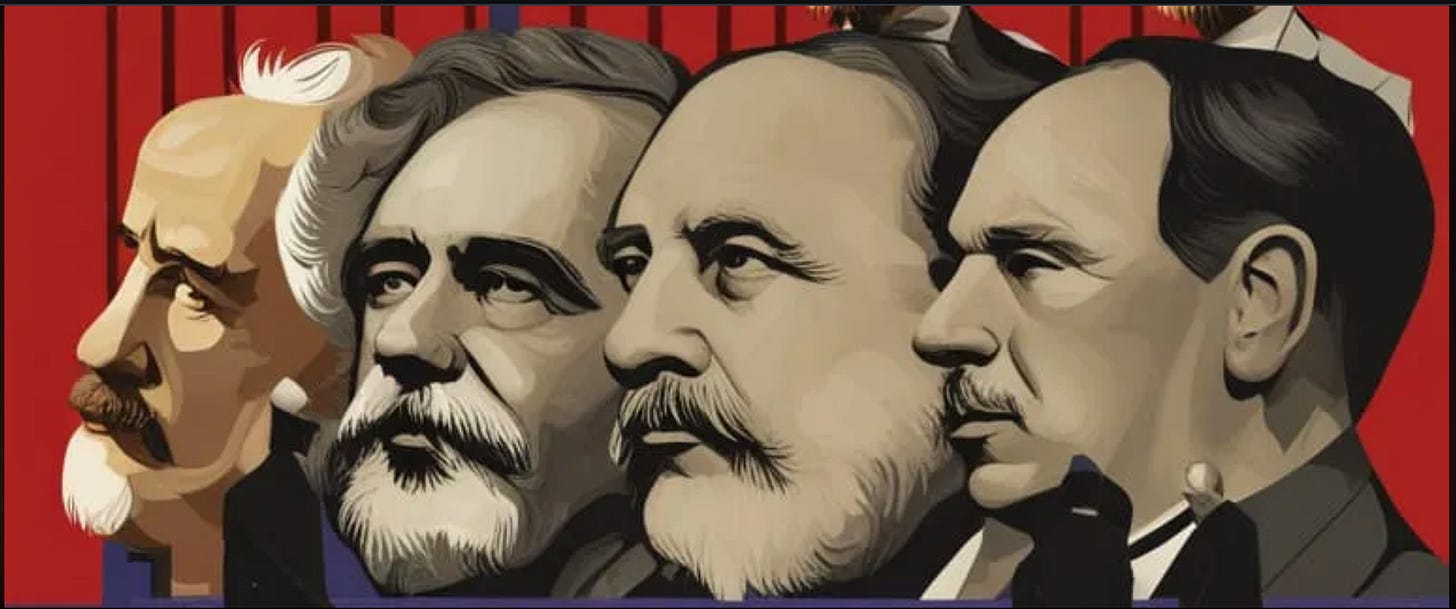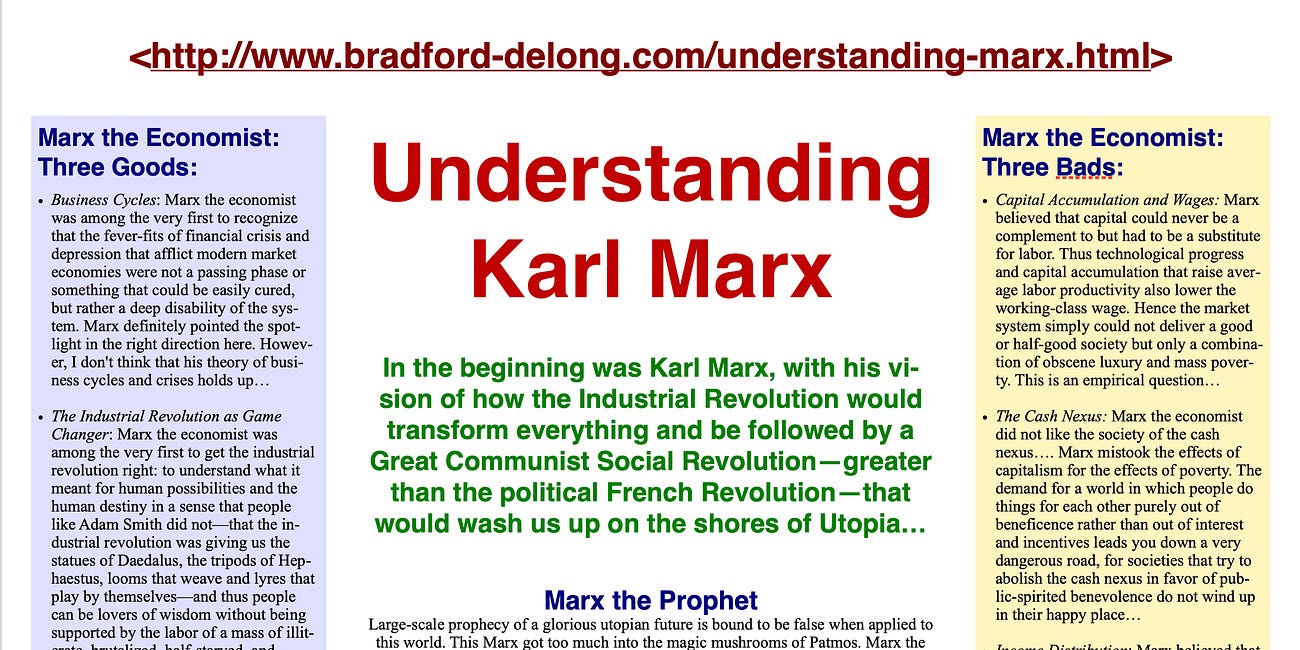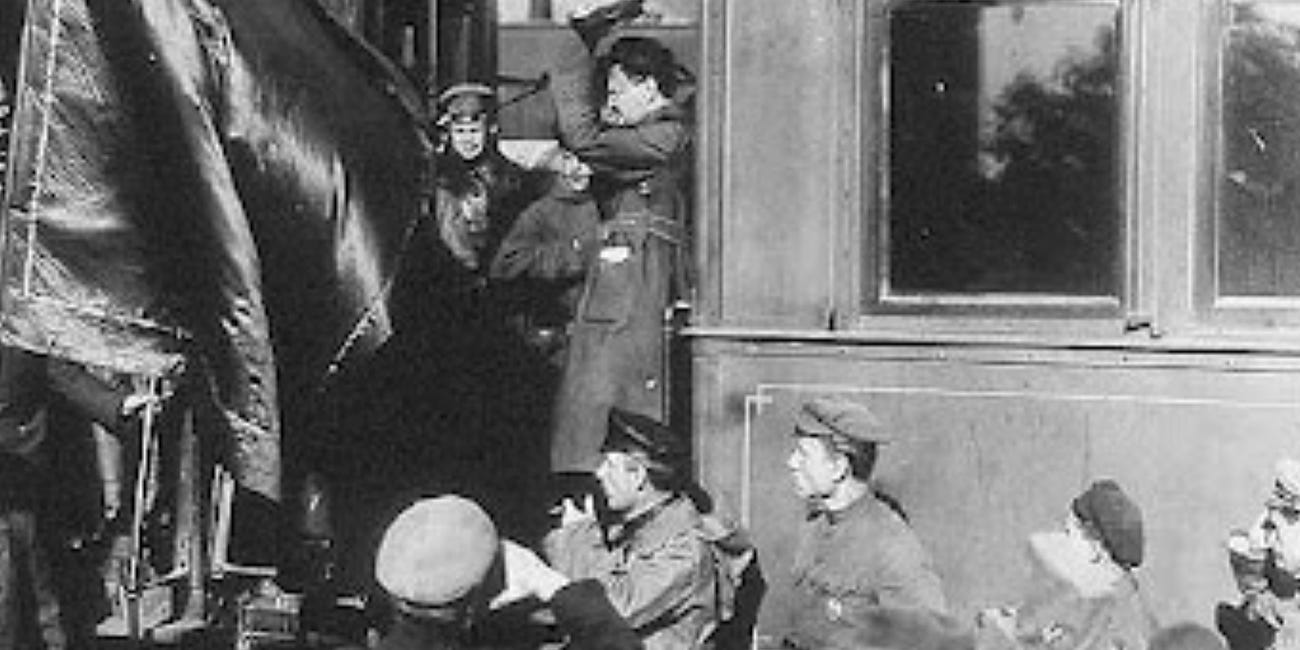
Matthew Yglesias writes:
Matthew Yglesias / proudly eponymous since 2002: Marxism: I can't say that I really understand the man's economic thought...
That's OK. I can't say I understand it either--and I've tried too hard, or so many say.
As I told my graduate students this year after I made them read the Manifesto of the Communist Party:
There are really five ways to understand Karl Marx's claim that economic laws make a Communist revolution both necessary and inevitable:
The Technology Marx: Capital is not a complement to but a substitute for labor, and so technological progress and capital accumulation that raise average labor productivity also lower the working-class wage. Hence the market system cannot and will be seen to be unable to deliver the good society we all deserve, and it will be overthrown...
The Extent-of-the-Market Marx: Businessmen continually extend the domain of capitalism, and competition from poor workers in newly-incorporated peripheral regions puts a lid on the wages of labor. Hence inequality grows in the core, and triggers revolution...
The Unveiling-of-Reality Marx: Previous systems of hierarchy and domination maintained control by hypnotizing the poor into believing that the rich in some sense "deserved" their high seats in the temple of civilization. Capitalism unveils all--replaces masked exploitation by naked exploitation--and without its ideological legitimation, unequal class society cannot survive...
The Ruling-Class-Trapped-by-Its-Ideology Marx: Although the ruling class could appease the working class by sharing the fruits of economic growth, they will not. They are trapped by their own ideological legitimation--they really do believe that it is in some sense "unjust" for a factor of production to earn more than its marginal product. Hence social democracy will inevitably collapse before an ideologically-based right-wing assault, income inequality will rise, and the system will be overthrown...
And the Solidarity Marx: Factory work--lots of people living in cities living alongside each other working alongside each other develop a sense of their common interest and of class solidarity, hence they will be able to organize, and revolt...
Which is the real Marx? Ah, grasshopper, not until you have learned not to ask that question will you be able to snatch the pebble from my hand...
Matthew goes on:
[B]ut he had himself some damn good aphorisms.... Marx's brilliant original eleventh thesis on Feuerbach "The philosophers have only interpreted the world, in various ways; the point is to change it."
No. The point is to change it in a positive direction. The American Enterprise Institute has "changed the world," and everybody based in reality recoils in horror. I prefer to ignore Thesis XI and to take my stand with John Maynard Keynes's view of Comrade Trotsky at the Cafe Central:
[Trotsky's] first proposition. The historical process necessitates the change-over to Socialism if civilisation is to be preserved.... Second proposition. It is unthinkable that this change-over can come about by peaceful argument and voluntary surrender. Except in response to force, the possessing classes will surrender nothing.... Third proposition.... The possessing classes will do lip-service to parliamentary methods so long as they are in control of the parliamentary machine, but if they are dislodged, then, Trotsky maintains, it is absurd to suppose that they will prove squeamish about a resort to force on their side.... Fourth proposition. In view of all this, whilst it may be good strategy to aim also at constitutional power, it is silly not to organise on the basis that material force will be the determining factor in the end. In the revolutionary struggle only the greatest determination is of avail to strike the arms out of the hands of reaction to limit the period of civil war, and to lessen the number of its victims....
Granted his assumptions, much of Trotsky's argument is, I think, unanswerable. Nothing can be sillier than to play at revolution.... But... he assumes that the moral and intellectual problems of the transformation of Society have been already solved--that a plan exists, and that nothing remains except to put it into operation.... He is so much occupied with means that he forgets to tell us what it is all for.... Trotsky's book must confirm us in our conviction of the uselessness, the empty-headedness of Force at the present stage of human affairs. Force would settle nothing no more in the Class War than in the Wars of Nations or in the Wars of Religion. An understanding of the historical process, to which Trotsky is so fond of appealing, declares not for, but against, Force at this juncture of things. We lack more than usual a coherent scheme of progress, a tangible ideal. All the political parties alike have their origins in past ideas and not in new ideas and none more conspicuously so than the Marxists. It is not necessary to debate the subtleties of what justifies a man in promoting his gospel by force; for no one has a gospel. The next move is with the head, and fists must wait…








"many say" - very dead link, even to Wayback Machine, but it is at http://jeffweintraub.blogspot.com/2006/08/marx-me-norman-geras.html